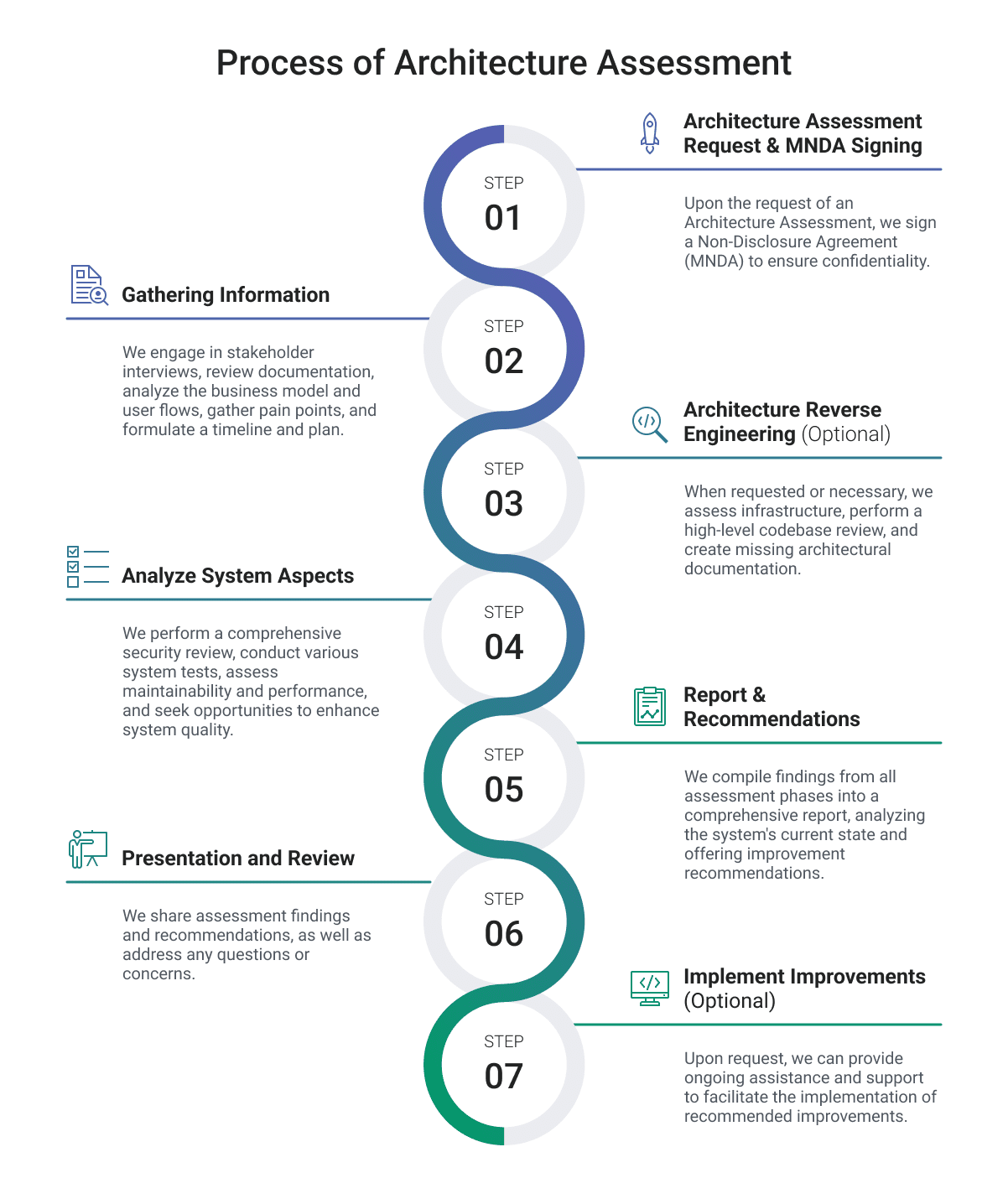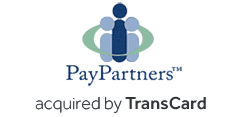Clear Vision of What Software Can Achieve
Don’t compound errors – know you’re building on a solid foundation.
Your software is your business: it supports you, your stakeholders, and your clients. Whether you need to know your product is running optimally, can handle upgrades or enhancements, or need to uncover security issues before disaster strikes, our code audit will give you the confidence to move forward decisively.
In our source code audits, we consider the following areas.
Ensure your software and code stand up to industry standards.
Process of Code Audit
Ensure code excellence: contact us for an independent code audit!
Code Audit Service vs Architecture Assessment
Code Audit Services
If you are seeking a less time-consuming process that entails a focused review of your codebase, a quick code audit may be perfect for you. Our senior developers will assess your codebase’s general perceived quality and structure. The primary focus is on evaluating the codebase for maintainability, modularity, and adherence to best practices to identify potential areas for refactoring or improvement.
Code Audits can typically take from 1 to 4 weeks depending on the size of the codebase and the amount of documentation.
Comprehensive Architecture Assessment
A comprehensive Architecture Assessment is perfect for businesses seeking a thorough and detailed analysis that provides valuable insights into the current state of their system's architecture and its quality attributes, including scalability, availability, security, performance, maintainability, and more. This assessment takes a holistic approach, covering various aspects of the system, and gives a comprehensive view of its strengths and weaknesses.
An architecture Assessment typically takes from 1 to 6 months, depending on the complexity of the system and the amount of documentation.

The Benefits of Software Code Audit Services

Assess Quality and Maintainability

Architecture Analysis

Verify Compliance

Further Software Improvements

Spot Possible Risks

Understand Scalability Limits

Improve Performance

Security Enhancement

Better Documentation
The Hidden Cost of Code Quality
$2.41 trillion - annual cost of poor software quality to U.S. companies in 2022 (up from $2.08 trillion in 2020)
90% of startups fail due to scaling challenges, technical debt, or misaligned teams
31.55% of development teams cite lack of time as the biggest barrier to ensuring code quality
57% of organizations are prioritizing improvements to their Quality Engineering processes
56% of tech leaders focus on increasing automated test coverage
47% of organizations are adopting AI tools for quality engineering
46% of companies are actively improving code quality standards
Don't let poor code quality cost your business millions.
Our comprehensive code audit identifies vulnerabilities, technical debt, and performance issues before they impact your bottom line.

Questions Softjourn Can Help You Answer
Does my application really need a rewrite?
Can my current application bear the increased load needed for market validation?
Does my current application support must-have features?
What's the most economical path for my application?
Can I build or integrate new features with my existing code?
What is needed for the longevity of my application?
What is the fastest way to develop an MVP or start a new iteration?
What architectural improvements are needed for a maintainable codebase?
Need a code audit? No matter the perspective - from security, maintainability, or scalability - we will make sure your code won’t cause problems down the road.
Our 4 Pillars of IT Due Diligence
Product Roadmap: Gain a comprehensive understanding of how your target or acquisition aligns with your current and future business and audience needs. This involves tracking, planning new features, conducting a UI/UX review, and more.
Technology Assessment: Obtain valuable insights through a thorough analysis, including architecture scalability, team readiness, current security, compliance levels, and identification of embedded issues and required fixes.
Economies of Scale: We'll guide you to identify quick wins, like consolidating similar functionalities across platforms (e.g., payment gateways, access control, venue mapping/seat selection).
Skills and Processes Review: Depending on the merger or acquisition, we'll help you identify key contributors for ongoing product development and long-term success. Understand internal processes like sprint planning and QA testing in depth.
Questions Softjourn Can Help You Answer
Does my application really need a rewrite?
Can my current application bear the increased load needed for market validation?
Does my current application support must-have features?
What's the most economical path for my application?
Can I build or integrate new features with my existing code?
What is needed for the longevity of my application?
What is the fastest way to develop an MVP or start a new iteration?
What architectural improvements are needed for a maintainable codebase?
Need a code audit? No matter the perspective - from security, maintainability, or scalability - we will make sure your code won’t cause problems down the road.
Our 4 Pillars of IT Due Diligence
Product Roadmap: Gain a comprehensive understanding of how your target or acquisition aligns with your current and future business and audience needs. This involves tracking, planning new features, conducting a UI/UX review, and more.
Technology Assessment: Obtain valuable insights through a thorough analysis, including architecture scalability, team readiness, current security, compliance levels, and identification of embedded issues and required fixes.
Economies of Scale: We'll guide you to identify quick wins, like consolidating similar functionalities across platforms (e.g., payment gateways, access control, venue mapping/seat selection).
Skills and Processes Review: Depending on the merger or acquisition, we'll help you identify key contributors for ongoing product development and long-term success. Understand internal processes like sprint planning and QA testing in depth.
A code audit is NOT:

A code audit does not involve team members reviewing each other's code for individual errors. Our code audit service focuses on identifying significant system-wide issues within your application.

Our code audit provides a technical evaluation of your project, pinpointing issues and offering guidance for the most effective next steps. If you require an assessment and resolution of specific software defects or bugs in your code, our QA services are the appropriate choice.
Code Audit Case Studies
Project Code Audit Deliverables
After we conduct our code audit, we present clients with a detailed report of our findings, potential code issues, and recommendations. The report includes both critical and non-critical issues as well as expert guidance on managing issues based on our client’s priorities. When necessary, we can involve a project manager in the software auditing process so you can receive detailed explanations of individual issues.
Depending on the project requirements, the report can include:
- Software code analysis
- Architecture analysis - including strengths and weaknesses
- Security audit
- Automation tests audit and pentest review
- Design review
- Software audit checklist
- Document findings from each phase of the assessment
- Recommendations for improving the assessed quality attributes

Reach out to our expert code audit consultants today and elevate the quality of your codebase!
More Than Just a Code Audit
A code audit is just the beginning. Many projects require a deeper evaluation to ensure scalability, security, and long-term success. That’s why we offer additional assessments tailored to different business needs.
Technology Expertise
We stay up-to-date with various modern tools and technologies to conduct software code audits that will provide your product's actual long-term value and security. Our Solutions Architects, Development, and QA teams will find the right tool stack based on your project needs and build a process to ensure all your goals are met.
Our software audit services include defining critical and non-critical issues and providing recommendations, plus a software audit checklist, to give our clients a sense of direction and steps to take moving forward, even after the project ends.
Engagement Models for IT Audit Services
Other Services We Offer
Whether upgrading/reviewing an existing code or creating a new one, the most important expertise we offer is a proven approach to mitigating risk and containing costs. Discover more about Softjourn's expert Consulting Services.
Often clients don’t know what product they need, but do know the results they want. Our job is to help define the product and develop optimal solutions to get those results. Learn more about Softjourn's Discovery Phase Services.
To compete, our clients continually need to provide new and better services. We have our own R&D Centers – started in 2008 – which uniquely positions us to do just that. Read more about Softjourn's Research and Development Services.
Our developers and illustrators are experts at UI and UX design. They will work with you to understand your needs in going from idea to prototype to deployment faster and at less cost. Explore further into Softjourn's Digital Product Design Services.
Software development has grown exponentially in recent decades. Softjourn is the solution to help you define and develop forward-thinking technology that gets real-world results. Get to know more about Softjourn's Software Engineering Services.
Our core belief is that analyzing and testing is critical because the essential role of software is so important. In the process, our Quality Assurance team helps you create superior products. Explore further into Softjourn's QA services.
Since day one, we’ve been providing application support and maintenance services to each customer on every project. It’s why we’re a proven, trusted partner and reliable asset. Get to know more about Softjourn's Application Support and Maintenance Services.
Our technology stack at Softjourn is designed to empower us to deliver world-class services to our clients. With a strong focus on innovation and efficiency, we continually adapt our expertise to stay ahead of the curve. Discover the Technologies and Frameworks we utilize, and learn how we can bring your ideas to life.

Client Testimonials
Tacit Corporation selected Softjourn for their product development because of their technical expertise and direct approach. Brenda Crainic, CTO of Tacit, highlighted, "We grew a lot as a company over the last 12 years and our processes changed, many of the current development practices being initiated by the team. I count a lot of my team’s expertise and I am confident in our ability to deliver cutting-edge technology for our clients.
Our team’s dedication to understanding Tacit's needs has been instrumental in enhancing their platform’s capabilities, ensuring thorough and effective code audit services. This ongoing collaboration underscores our commitment to delivering high-quality, innovative services that support our clients' visions." - Brenda Crainic, CTO and Co-Founder of Tacit
Code Audit FAQ
Conducting a code audit is crucial when you have an antiquated product that is soon to be outdated. There are two potential approaches for conducting a code audit; you can either hire an IT audit company or let an in-house team of developers handle it. Either way, a code audit expert will help guide you through the process.
Code audits have several distinct phases that are the basis of each review:
- Phase 1: Analyze the present project structure and functionality.
- Phase 2: Discover existing and potential bugs.
- Phase 3: Determine security breaches and vulnerabilities.
- Phase 4: Validate the current performance and scalability.
- Phase 5: Assess the code maintainability level and associated risks and costs.
There are three main factors that determine how long code auditing will take: the size of the project, the number of third-party services, and the software аrchitecture.
Depending on the project's complexity, a code audit could take 1 to 4 weeks for a smaller project, and up to 6 months for an enterprise-sized architecture assessment. We can provide a clear estimate of the cost and schedule of IT audit services after we assess your project.
While open source is a crucial component of most modern software development, many companies ignore license and security risks in their code and should increase their awareness of the open source they're utilizing. A thorough open source software audit is essential to uncover these risks.
How our process looks:
- A Code Audit is Requested
- MNDA Signing
- Introduction Interview
- Grant Code Repository Access
- Audit Process
- Review of the infrastructure
- Assessment of the architecture
- Backend audit
- Frontend audit
- We provide you with a Code Audit Report, Recommendations Delivery, and other audit deliverables
- Additionally, we can guide your team or assemble a dedicated team to fix any issues found.
The most common code audit techniques include a manual review and an automated source code analysis.
A manual code audit identifies vulnerabilities as well as functional flaws. Most companies have trouble internally providing a code audit expert, security resources, and the amount of time required for a manual code review. This is why we typically recommend hiring an independent third-party to manually audit the code rather than conduct your own internal audit.
Plus, hiring software auditors externally guarantees an unbiased audit. A manual code audit is carried out in three stages: a review of the infrastructure and the architecture, a backend code review, and a frontend code review.
Automated source code analysis makes the manual code audit process more efficient, affordable, and quickly achievable. This method of code audit results in a significant reduction in time required, while providing considerable cost savings and actionable metrics. Popular automated code review tools are Github, Gitlab, and Crucible.
There are multiple situations and company types that might require a code audit, including:
1. Startups
If you have legacy code that’s bootstrapped an MVP or pieced code together by multiple teams over time, it’s important to get a holistic view of your code base in a report that any founder can clearly understand.
A code audit will help you:
- Determine code quality
- Check for scalability
- Highlight vulnerabilities
- Find bugs before users do
2. M&A Tech Due Diligence
When evaluating startups for investments, investors must have a transparent view of their existing code and its current state with proper technical due diligence. During the acquisition of a software company or the intellectual property (IP) belonging to a company, it is essential that products containing open-source code are identified.
A code audit will ensure:
- Transparency for investors
- Easy to understand reports
- Verification of the functionality of existing apps
- Checks for scalability
3. Periodic Reviews for Ongoing Projects
Every time a new team takes on a new project, a code review will help them get familiar with the codebase. New teams will get onboarded faster with less confusion, meaning projects get off the ground with greater speed and higher quality.
4. Verifying Outsourcing Code Services
If you subcontract software development from a third-party developer, you might request assurances or a guarantee that your codebase will not contain any open-source code. It is essential to conduct an open-source code audit to verify that the outsourcing company is compliant. A code audit will also confirm the quality of the code by an unbiased third party.
A software code audit is an essential part of development and is especially necessary to perform before making any large changes or adding new features to an application.
A code audit is a process that aims to find and eliminate any errors, bugs, security breaches, licensing violations, and areas that fail to reach the required quality standards set by the company. When performing audits, every critical component should be audited separately and together with the entire system.
A quality code audit can be the difference between having high-performing, functional, and easy-to-maintain code and having buggy code prone to having security issues and poor functionality.
Yes, a code audit or review is considered to be the first stage of technical due diligence in the M&A process. A code review is focused on checking tech architecture and the solution regarding the interface, integrations, and code.
Both independent and in-house code audits have their unique advantages and drawbacks. Here is a comparison between the two:
Objectivity: Independent code audit services offer an unbiased, third-party perspective, whereas internal biases or organizational pressures can influence in-house audits.
Expertise: Independent code audit service companies typically employ professionals with a wide range of industry experience and expertise. On the other hand, in-house audits may be limited by your internal team's expertise.
Time and Resources: In-house audits may save on external costs, but they can consume valuable internal resources and time that could otherwise be spent on core development tasks. Independent code audit service companies, by contrast, provide a dedicated team for the audit, freeing up your resources.
Knowledge Transfer: Сompanies offering independent code audit services bring fresh insights and best practices from their work across multiple industries, whereas in-house audits may focus more on existing company practices.
Scalability: Third-party code audit companies can quickly
Deciding between a code audit and an architecture assessment depends on your specific needs and goals. Here's a breakdown of the pros and cons of each to help you make an informed decision:
- Code Audit:
Pros:
- Short timeline
- Fewer resources needed
- Allows for identifying major issues
Cons:
- Potential to miss some issues
- Limited scope
- Does not assess the system as a whole
- Can't evaluate system quality attributes (e.g., scalability, security)
- Architecture Assessment:
Pros:
- Brings the most value due to its holistic analysis
- Covers the most aspects of the system
- Allows for targeted improvements
Cons:
- Complexity
- Time-consuming
- Resource-intensive
Choose a code audit for a quick assessment of code-related issues, but be aware of its limitations in evaluating the entire system.
Opt for an architecture assessment to gain a comprehensive view of system aspects, including design, scalability, and security, despite requiring more time and resources. Your decision should align with your specific needs and priorities.
































-new.png)
-new.png)

.webp)
.webp)








